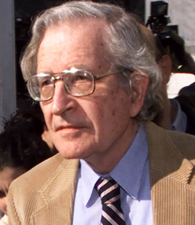The founder of modern linguistics and one of the most esteemed (and controversial) political theorists and activists of our age, Noam Chomsky has inspired, aggravated and astounded many. The first to devise a theory about the biological innateness of language and a vocal critic of American foreign policy and media, he continues to be a source of unparalleled insight and inflammatory remarks.
Noam Chomsky’s Early Days
Noam Chomsky was born in Philadelphia on December 7, 1928. At the University of Pennsylvania, Chomsky pursued undergraduate and graduate work in linguistics; early in his studies, a professor suggested that Chomsky turn his focus to the systematic structure of a language. Chomsky chose Hebrew and the project evolved into his undergraduate thesis, and eventually, a book. After completing his graduate work at Penn, he became a linguistics professor at the Massachusetts Institute of Technology.
Chomsky’s Notable Achievements
Chomsky developed groundbreaking theories in the field of psycholinguistics. Before Chomsky, behaviorist theory argued that language was a purely learned ability; Chomsky’s cognitive theory posited that there was something innate in humans, a language faculty, that enabled people to acquire language.
Chomsky asserts that this language faculty has a biological origin, and that all languages share the same underlying deep structure, a universal grammar. The individual grammars of our particular languages spring from this universal grammar, which consists of a series of fixed principles and several parameters whose values become set as a child acquires language.
Sources in this Story
- MIT Department of Linguistics and Philosophy (via NoamChomsky.com): Noam Chomsky
- Routledge Encyclopedia of Philosophy (via NoamChomsky.com: Noam Chomsky
- The New York Times: A Changed Noam Chomsky Simplifies
- University of Pennsylvania: The Online Books Page: Online Books by Noam Chomsky
- January Magazine: January Interview: Noam Chomsky
- Democracy Now: Noam Chomsky: Why is Iraq Missing from 2008 Presidential Race?
- Prospect magazine: For and against Chomsky
- BBC News: Viewpoints: Where now for capitalism?
- University of Arizona: Noam Chomsky
Although a handful of philosophers, psychologists and linguists have tried to argue with Chomsky over the years, rejecting the concept of a language faculty has been of little to no avail. His linguistic theories are currently adopted by most linguists and psychologists, and, as it turns out, resonate as intuitive to laypeople as well. However, a more recent innovation, the Minimalist Program, has been more difficult for researchers and theorists to accept.
For all practical purposes, Chomsky has defined modern linguistics, but he is equally renowned for his politics, serving as a vocal, and much heeded, leftist social critic. He began by openly criticizing the Vietnam War and much of ensuing American foreign policy. He has been freely critical of the media as well, accusing it of helping government to spin bad policy and failing to educate the people. He went on to write many books and articles addressing these concerns. Some of Chomsky’s books can be read via The Online Books Page at the University of Pennsylvania.
The Man and his Work
- “Syntactic Structures”
- “Language and Mind”
- “On Nature and Language”
- “The Chomsky Reader”
- “Failed States: The Abuse of Power and the Assault on Democracy”
- “The Chomsky Sessions: Noam Chomsky On The World” (DVD)
The Rest of the Story
In a July 2008 interview with January magazine, Chomsky said that he would never give up political activism, even as he continued to pursue the great questions of linguistics. For years, he has been a vocal opponent of the Israeli government—just one reason why he inspires heated response from others.
But he is considered an authority on matters regarding the Middle East; Amy Goodman of Democracy Now interviewed him about the war in Iraq on the night of an early Democratic primary debate. Chomsky gave a thorough assessment of how he believed the war was affecting the election, and argued that the notion that the whole world hated American values was “incorrect. It’s fed by propaganda.”
Critics of Chomsky have accused him of being “anti-American.” A 2005 piece in Prospect magazine featured two authors debating for and against Chomsky. Writing against Chomsky, Oliver Kamm points to some of Chomsky’s more extreme views, such as likening September 11 to the U.S. bombing of Sudan. He asserts that Chomsky’s arguments indicate a low opinion of America that, in consequence, compromises his clarity. But Robin Blackburn claims Chomsky’s antigovernment leanings are a sign of individuality, and that his ability to link politics and linguistics signifies a truly great mind.
And many continue to regard him as such; in September 2008, as the first wave of the economic crisis surged, Chomsky was one of several experts asked by the BBC to predict the future of capitalism.
In 2017, Chomsky joined the University of Arizona faculty as Laureate Professor of Linguistics, Agnese Nelms Haury Chair.
This article was originally written by Rachel Balik; it was updated December 10, 2017.











